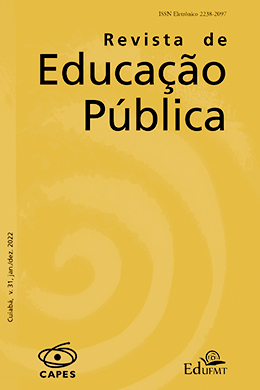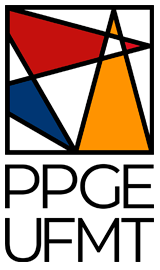BLENDED LEARNING EM EDUCAÇÃO BÁSICA E SUPERIOR: REVISÃO DE LITERATURA DAS TEMÁTICAS FOCADAS NOS ALUNOS
DOI:
https://doi.org/10.29286/rep.v31ijan/dez.13397Palavras-chave:
Educação híbrida, Tecnologias Digitais, COVID-19, Metodologia de Ensino e AprendizagemResumo
Apresentam-se os resultados da revisão sistemática de literatura (RSL) sobre o blended learning ou ensino híbrido ou educação híbrida em educação básica e superior. Para examinar as perspectivas sobre os alunos em estudos de RSL no período de 2015 a 2021, foram consultadas as bases EBSCO, ERIC, SciELO Brasil, SciELO, SCOPUS e WOS. O escopo dos 25 artigos selecionados abrange mais de mil trabalhos dos últimos 29 anos. As principais temáticas focam nas metodologias de ensino, na satisfação e engajamento, e aprendizagem das perspectivas da eficácia, vantagens e desvantagens e personalização. Falta desenvolver mais pesquisas empíricas baseadas em evidências.
Downloads
Referências
ARMELLINI, A.; PADILLA RODRIGUEZ, B. C. Active Blended Learning: Definition, Literature Review, and a Framework for Implementation. Cases on Active Blended Learning in Higher Education, p. 1-22, 2021.
ASTUDILLO, M. V. Aceitação e uso de tecnologias por estudantes do ensino superior. In: Martha Bhorer Adaime; Jerônimo Siqueira Tybusch; Sílvia María de Oliveira Pavão; Bruna Pereira Alves Fiorin (Org.). Promoção da aprendizagem e tecnologias educacionais. 1ed. Santa Maria: FACOS-UFSM, p. 202-213, 2019.
ASTUDILLO, M. V.; MARTÍN-GARCÍA, V. Teoria da atividade: fundamento para estudo e desenho do blended learning. Cadernos de Pesquisa, v. 50, p. 515-533, 2020.
ASTUDILLO, M. V. The Blended Learning Pedagogical Model in Higher Education. In: MARTÍN-GARCÍA, Antonio (Ed.), Blended Learning: Convergence between Technology and Pedagogy, pp. 141-166. Switzerland: Springer, 2020. Disponible en: https://doi.org/10.1007/978-3-030-45781-5_7. Acceso en: 21 dez. 2021.
CASTIONI, R. et al. Universidades federais na pandemia da Covid-19: acesso discente à internet e ensino remoto emergencial. Ensaio: Avaliação e Políticas Públicas em Educação, v. 29, p. 399-419, 2021.
CLEVELAND-INNES, M.; WILTON, D. Guide to blended learning, Canada: Commonwealth of Learning, 2018.
DE-LA-TORRE-UGARTE-GUANILO, M. C.; TAKAHASHI, R. F.; BERTOLOZZI, M. R. Revisão sistemática: noções gerais. Revista da Escola de Enfermagem USP, São Paulo, v. 45, n. 5, p. 1260 - 1266, out. 2011. DOI: http://dx.doi.org/10.1590/.
DZIUBAN, C; GRAHAM, C. R.; MOSKAL, P. D.; NORBERG, Anders; SICILIA, Nicole. Blended learning: The new normal and emerging technologies. International Journal of Educational Technology in Higher Education, 15(1), fev. 2018. Disponible en: https://doi:10.1186/s41239-017-0087-5. Acesso em 30 de jan. 2022.
DOMINGUEZ, F. R; VEIGA, A. M. R; ASTUDILLO, M. V. Blended learning no Ensino Superior: o cenário das pesquisas nacionais e internacionais. Research, Society and Development, v. 9, n. 11, eXX, 2020 (CC BY 4.0) | ISSN 2525-3409. DOI: http://dx.doi.org/10.33448/rsd-v9i11.XX.
ECHEVERRÍA, J. ¿Internet en la escuela o la escuela en Internet? Revista de educación, p. 199-206, 2002. Disponível em: http://www.educacionyfp.gob.es.
ECHEVERRÍA, J. Expandir la educación al tercer entorno. In: DÍAZ, Rubén; FREIRE, Juan. (Orgs.). Educación expandida. Sevilla: Colectivo Zemos 98, pp. 167-184, 2012.
ENGESTRÖM, Y.; SANNINO, A. Studies of expansive learning: Foundations, findings and future challenges. Educational Research Review, v. 5, n. 1, p. 1-24, 2010.
FREIRE, P. Pedagogia do Oprimido. 17 ed. Rio de Janeiro: Paz e Terra, 1987.
GRAHAM, C. (Ed.) The handbook of blended learning. Global perspectives, local designs. San Francisco: CA: Pfeiffer Publishing, 2006.
JOHNSON, N.; VELETSIANOS, G.; SEAMAN, J. U.S. Faculty and Administrators’ Experiences and Approaches in the Early Weeks of the COVID-19 Pandemic. Online Learning, 24(2), jun. 2020. Disponível em: .
MASLAND, L.; GIZDARSKA, S. (2018). "Then what am I paying you for?" Student attitudes regarding pre-class activities for the flipped classroom. International Journal of Teaching and Learning in Higher Education, 30, 234 - 244.
MONTEIRO, A.; MOREIRA, J. A.; LENCASTRE, José Alberto. Blended (e) Learning na Sociedade Digital. Whitebooks, 2015.
GARRICK, B., PENDERGAST, D.; GEELAN, D. Introduction to the philosophical arguments underpinning personalised Education. In: Theorising Personalised Education. Singapura: Springer, 2017.
PAGE, M. et al. The PRISMA 2020 statement: an updated guideline for reporting systematic reviews. BMJ, v. 372, 2021. DOI: 10.1136/bmj.n.71.
PALMER, E.; LOMER, S.; BASHLIYSKA, I. Overcoming barriers to student engagement with Active Blended Learning. University of Northampton, Institute for Learning & Teaching, p. 1-12, 2017.
PICÓN, M. L. ¿Es posible la enseñanza virtual? Foro Educacional, 11-34, mai. 2020. Disponível em: .
PICCIANO, A. G.; DZIUBAN, C. R. Blended learning: research perspectives. Needham, MA: The Sloan Consortium, 2007.
PICCIANO, A. G.; DZIUBAN, C. D.; GRAHAM, C. R. (org.). Blended learning: research perspectives. Nova York: Routledge, 2014.
ROSS, B.; GAGE, K. Global perspectives on blending learning. In: BONK, Curtis; In: GRAHAM, Charles (Ed.) The handbook of blended learning. Global perspectives, local designs. San Francisco: CA: Pfeiffer Publishing, 2006.
ROZA, J. C.; VEIGA, A. M. da R.; ROZA, M. P. Blended learning: uma análise do conceito, cenário atual e tendências de pesquisa em teses e dissertações brasileiras. Educação Temática Digital, v. 21, n. 1, p. 202-221, 2019.
SURMA, T.; KIRSCHNER, P. A. Technology enhanced distance learning should not forget how learning happens. Computers in Human Behavior, v. 110, p. 106390, 2020. https://doi:10.1016/j.chb.2020.106390.
UNESCO. COVID-19 and higher education: Today and tomorrow. Impact analysis, policy responses and recommendations. UNESCO, IESALC, mai. 2020. Disponível em: <https://cutt.ly/VjPR2hA>.
UNIVERSITY OF NORTHAMPTON UON. Institute for Learning & Teaching. Active Blended Learning, 2020. Disponível em <https://www.northampton.ac.uk/ilt/current-projects/abl/>.
REFERÊNCIAS das publicações analisadas na Revisão Sistemática da Literatura
AL-SAMARRAIE, H.; SAEED, N. A systematic review of cloud computing tools for collaborative learning: Opportunities and challenges to the blended-learning environment. Computers and Education, v. 124, p. 77–91, 2018.
ALAMMARY, A. Blended learning models for introductory programming courses: A systematic review. PLoS ONE, v. 14, n. 9, p. 1–27, 2019.
ALAMMARY, A. Blended learning models for introductory programming courses: A systematic review. PloS one, v. 14, n. 9, p. e0221765, 2019.
ALAMRI, H. A.; WATSON, S.; WATSON, W. Learning technology models that support personalization within blended learning environments in higher education. TechTrends, v. 65, n. 1, p. 62-78, 2021.
ANTHONY, B. et al. Blended Learning Adoption and Implementation in Higher Education: A Theoretical and Systematic Review. Technology, Knowledge and Learning, n. 0123 789, 2020.
ANTHONYSAMY, L.; KOO, A. C.; HEW, S. H. Self-regulated learning strategies and non-academic outcomes in higher education blended learning environments: A one decade review. Education and Information Technologies, p. 3677–3704, 2020.
BARAGASH, R. Methods for measuring engagement in the blended learning environment: A review paper. ASM Science Journal, 13, 32-38, 2020.
BOELENS, R.; DE WEVER, B.; VOET, M. Four key challenges to the design of blended learning: A systematic literature review. Educational Research Review, v. 22, p. 1–18, 2017.
BOND, M. et al. Mapping research in student engagement and educational technology in higher education: a systematic evidence map. International Journal of Educational Technology in Higher Education, v. 17, n. 1, 2020.
BOTELHO, M. G.; AGRAWAL, K. R.; BORNSTEIN, M. M. An systematic review of e-learning outcomes in undergraduate dental radiology curricula—levels of learning and implications for researchers and curriculum planners. Dentomaxillofacial Radiology, v. 48, n. 1, p. 1–11, 2019.
CELESTINO, E. H.; BACKX NORONHA VIANA, A. Blended learning: uma revisão sistemática sobre vantagens e desvantagens na percepção dos alunos e impactos nas IES. Administração: Ensino e Pesquisa, v. 22, n. 1, p. 33–67, 2021.
COYLE, K. K. et al. Blended Learning for Sexual Health Education: Evidence Base, Promising Practices, and Potential Challenges. Journal of School Health, v. 89, n. 10, p. 847–859, 2019.
JOWSEY, T. et al. Blended learning via distance in pre-registration nursing education: A scoping review. Nurse Education in Practice, v. 44, 2020.
KOH, J. H. L. Four pedagogical dimensions for understanding flipped classroom practices in higher education: A systematic review. Educational Sciences: Theory and Practice, v. 19, n. 4, p. 14–33, 2019.
LACTONA, Suryanto. Efficacy and knowledge of conducting CPR through online learning during the COVID-19 pandemic: A literature review. Journal of Public Health Research, v. 10, n. 2, 2021.
LI, C. et al. The effects of blended learning on knowledge, skills, and satisfaction in nursing students: A meta-analysis. Nurse Education Today, v. 82, p. 51–57, 2019.
MARTINENGO, L. et al. Digital education for the management of chronic wounds in health care professionals: Protocol for a systematic review by the digital health education collaboration. JMIR Research Protocols, v. 8, n. 3, p. 1–9, 2019.
MARZOUKI, O. F.; IDRISSI, M. K.; BENNANI, S. Effects of social constructivist mobile learning environments on knowledge acquisition: A meta-analysis. International Journal of Interactive Mobile Technologies, v. 11, n. 1, p. 18–39, 2017.
MCCUTCHEON, K.; LOHAN, M.; TRAYNOR, M. A systematic review protocol on the use of online learning versus blended learning for teaching clinical skills to undergraduate health professional students. Higher Education Pedagogies, v. 1, n. 1, p. 82–88, 2016.
MORRIS, D. A review of information literacy programmes in higher education: The effects of face-to-face, online and blended formats on student perception. Journal of Information Literacy, v. 14, n. 1, p. 19–40, 2020.
MUBAYRIK, H. BIN. The present and future state of blended learning at workplace-learning settings in adult education: A systematic review. Journal of Social Studies Education Research, v. 9, n. 4, p. 247–273, 2018.
NORTVIG, A. M.; PETERSEN, A. K.; BALLE, S. H. A literature review of the factors influencing e-learning and blended learning in relation to learning outcome, student satisfaction and engagement. Electronic Journal of e-Learning, v. 16, n. 1, p. 45–55, 2018.
POIRIER, M.; LAW, J. M.; VEISPAK, A. A Spotlight on Lack of Evidence Supporting the Integration of Blended Learning in K-12 Education. International Journal of Mobile and Blended Learning, v. 11, n. 4, p. 1–14, 2019.
PULHAM, E.; GRAHAM, C. R. Comparing K-12 online and blended teaching competencies: a literature review. Distance Education, v. 39, n. 3, p. 411–432, 2018.
RASHEED, R. A.; KAMSIN, A.; ABDULLAH, N. A. Challenges in the online component of blended learning: A systematic review. Computers and Education, v. 144, 2020.
VO, H. M.; ZHU, C.; DIEP, N. A. The effect of blended learning on student performance at course-level in higher education: A meta-analysis. Studies in Educational Evaluation, v. 53, p. 17–28, 2017.






















































